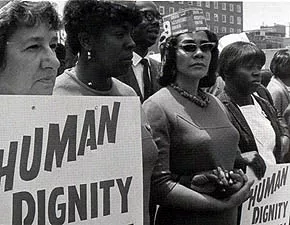
Audio
"B" is for Briggs v. Elliott (1954). Briggs v. Elliott was one of five cases, collectively entitled Brown et al. v. Board of Education of Topeka, Shawnee, KS, et al., argued before the U.S. Supreme...
Black History Month is celebrated every February to honor the achievements of African Americans who have shaped American history. Historian Carter G. Woodson hoped to raise awareness of African American's contributions to civilization by establishing Negro History Week. The event was first celebrated during a week in February 1926 that included both Abraham Lincoln and Frederick Douglass' birthdays. The week was later expanded to a month in 1976 during the United States bicentennial.
PHOTO: On March 20, 1969, Black hospital workers at the Medical College of South Carolina in Charleston went on strike to protest the firing of twelve employees and to call for higher wages and union recognition.

Audio
"B" is for Briggs v. Elliott (1954). Briggs v. Elliott was one of five cases, collectively entitled Brown et al. v. Board of Education of Topeka, Shawnee, KS, et al., argued before the U.S. Supreme...
Audio
"B" is for Brown, Lucy Hughes (1863-1911). Physician. A native of North Carolina, Brown completed her medical training at the Women’s Medical College of Pennsylvania. After practicing medicine in...
Audio
"C" is for Colonoware. On historic-period sites in South Carolina, archaeologists often find locally made, hand-built unglazed pottery that was fired in open hearths rather than kilns. Vessels and...
Audio
"H" is for Hunter, Jane Edna Iris (1882-1971). Nurse, social worker. Family circumstances forced Hunter to go into domestic service when barely in her teens. She was able to work her way through...
Audio
"B" is for Brown, William Melvin, Jr. (1934-1994). Manufacturer. A native Charlestonian and a graduate of South Carolina State, Brown served in the Army, taught in the Charleston County schools, and...
Audio
"H" is for Hunter-Gault, Charlayne (b. 1942). Journalist, civil rights activist. Hunter-Gault attended Wayne State University in Detroit before a judge allowed her to desegregate the University of...
Audio
"P" is for Praise Houses. “Praise houses” (sometimes called “prayer houses”) functioned on antebellum South Carolina plantations as both the epitome of slave culture and symbols of resistance to...
Audio
"S" is for Slave Patrols. Slave patrols were a crucial mechanism of slave control in colonial and antebellum South Carolina. Like the state’s earliest slave codes, the earliest slave patrol systems...
Audio
"S" is for Slave Religion. Enslaved Africans brought their traditional belief systems with them and little effort was made to evangelize them until the 1820s—because some slaveholder thought...
Audio
“S” is for Simkins, Modjeska Monteith [1899-1992] Educator, civil rights organizer, community activist. Simkins’s inspiration to become an advocate for the black community came from her parents. After...